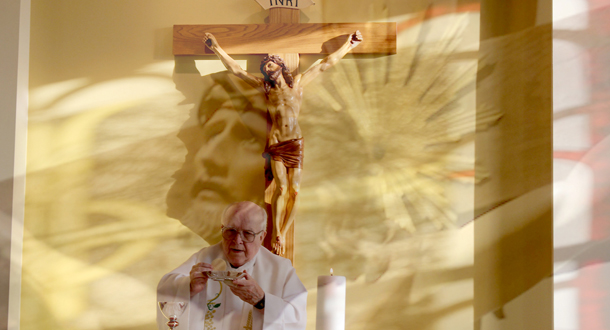
Scripture:
Reflection:
What does a 5th century hermit cave dweller and monk have to do with us in the 21st century? We might ask that same question about a prophet who was caught up in the sway of a mystical vision nearly 3,000 years ago, or about a persecuted and cowering Mediterranean Christian community 2,000 years ago? The answer lies in the words of Jesus in today’s Gospel: “It is enough for the disciple to be like the master” (Mt 10:25), meaning that we students, we disciples are challenged to learn obedience and radical trust in God from Jesus.
St. Benedict of Nursia (480-540), the Father of Western monasticism lived a hermit’s life in a cave for many years. His holiness, however, so attracted followers that he eventually went to Monte Cassino where he founded a monastery. There he wrote what came to be known as The Rule. It was to shape monastic life in Western Europe profoundly until the middle of the 11th century. In fact, Benedict’s Rule has been the model for many religious communities even today. The Rule is concise – barely 12,000 words. Yet, unmistakably, obedience is its main emphasis. But Benedict’s understanding of obedience did not mean heavy-handed authority or joyless commandments. No. Benedict saw obedience in relation to a transformation of the self within community, and a restoration of relationship with God. Benedict’s monks were students called to a special way of life in order to imitate Jesus and to learn obedience and trust in God.
In today’s first reading, God called Isaiah to mission. Isaiah’s apocalyptic-like vision revealed his sinfulness, and his unworthiness to be God’s choice as prophet to his community. “Whom shall I send? Who will go for us?” God asked. Despite his inadequacies, Isaiah trusted in God, and like a good student, shouted, “Here I am. Send me!” (1Is 6:8).
The evangelist Matthew wrote his Gospel, in part, to fortify and exhort his community in the throes of persecution and fear. In chapter 10, the Matthean community read how Jesus called his rag-tag, mixed bag of disciples by name and sent them out with the words: “Proclaim the Good News! The Kingdom of Heaven is near. Cure the sick, raise the dead, cleanse the lepers, cast out demons.” And Jesus added “Do not be afraid” (Mt 10:31). God chose this early Christian community to imitate the teacher, Jesus, and, in obedience, to proclaim the Good News.
Returning to the questions at the beginning of this reflection, what do all these students have to do with us today? Just this: like them, God chooses us, not because we are so holy or saintly, but precisely because we are broken, uncertain, inadequate. God calls us by name, asking over and over, “Whom shall I send?” Will we students learn obedience and trust from our teacher? Will we go out to proclaim the Good News to the ill and despairing among us? Will we heal the sick with compassion, raise those dead to hope with acts of kindness, and cast out demons of despair? Do we, who today are caught in this pandemic moment, feel utterly inadequate to respond to God’s call?
God’s question, nevertheless, remains unchanged. It echoes across the millennia: “Whom shall I send?” God awaits our obedient and trusting response: “Send me.”
Deacon Manuel Valencia is on the staff at Mater Dolorosa Passionist Retreat Center, Sierra Madre, California.
